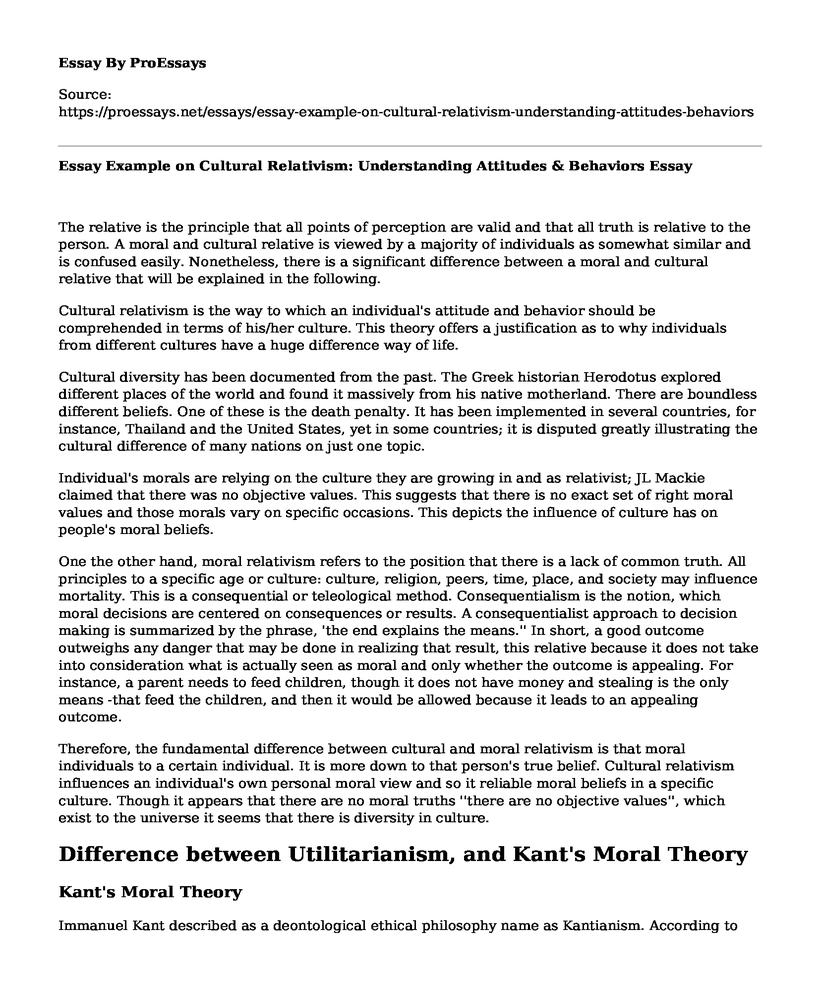The relative is the principle that all points of perception are valid and that all truth is relative to the person. A moral and cultural relative is viewed by a majority of individuals as somewhat similar and is confused easily. Nonetheless, there is a significant difference between a moral and cultural relative that will be explained in the following.
Cultural relativism is the way to which an individual's attitude and behavior should be comprehended in terms of his/her culture. This theory offers a justification as to why individuals from different cultures have a huge difference way of life.
Cultural diversity has been documented from the past. The Greek historian Herodotus explored different places of the world and found it massively from his native motherland. There are boundless different beliefs. One of these is the death penalty. It has been implemented in several countries, for instance, Thailand and the United States, yet in some countries; it is disputed greatly illustrating the cultural difference of many nations on just one topic.
Individual's morals are relying on the culture they are growing in and as relativist; JL Mackie claimed that there was no objective values. This suggests that there is no exact set of right moral values and those morals vary on specific occasions. This depicts the influence of culture has on people's moral beliefs.
One the other hand, moral relativism refers to the position that there is a lack of common truth. All principles to a specific age or culture: culture, religion, peers, time, place, and society may influence mortality. This is a consequential or teleological method. Consequentialism is the notion, which moral decisions are centered on consequences or results. A consequentialist approach to decision making is summarized by the phrase, 'the end explains the means.'' In short, a good outcome outweighs any danger that may be done in realizing that result, this relative because it does not take into consideration what is actually seen as moral and only whether the outcome is appealing. For instance, a parent needs to feed children, though it does not have money and stealing is the only means -that feed the children, and then it would be allowed because it leads to an appealing outcome.
Therefore, the fundamental difference between cultural and moral relativism is that moral individuals to a certain individual. It is more down to that person's true belief. Cultural relativism influences an individual's own personal moral view and so it reliable moral beliefs in a specific culture. Though it appears that there are no moral truths ''there are no objective values'', which exist to the universe it seems that there is diversity in culture.
Difference between Utilitarianism, and Kant's Moral Theory
Kant's Moral Theory
Immanuel Kant described as a deontological ethical philosophy name as Kantianism. According to Kantianist, human beings are moral agents that should employ thinking when making ethical decisions (Reath, 12). Further, he claims that one can only arrive at morally worth decisions when directed by duty and goodwill. Goodwill signifies the capability of human beings in taking decisions founded on principles.
Utilitarianism
Utilitarianism is the key principle of the ethical view that actions should generate not only pleasure but also happiness to a large number of individuals. The moral theory of the value of taking into account the possible consequences of actions; Mill the author of the theory discoursed that an ethical decision is one that converts to a measure of pleasure and happiness (WaiYing, 285-300). Thus, if more individuals found happiness and pleasure in the decision, then that action is perceived as more ethical. This philosophy encourages the compromise of individuals, whereas focusing on enhancing a higher sense of common good in society.
The best moral philosophy is utilitarianism because it determines right from wrong by focusing. Utilitarianism holds that the most ethical choice is the one that will create the utmost good for the greatest number.
Works Cited
Reath, A. (2006). Agency and autonomy in Kant's moral theory. Oxford University Press on Demand. Retrieved from: DOI:10.1093/0199288836.001.0001
WaiYing, Wong. "Confucian ethics and virtue ethics." Journal of Chinese Philosophy 28.3 (2001): 285-300.
Cite this page
Essay Example on Cultural Relativism: Understanding Attitudes & Behaviors. (2023, Feb 27). Retrieved from https://proessays.net/essays/essay-example-on-cultural-relativism-understanding-attitudes-behaviors
If you are the original author of this essay and no longer wish to have it published on the ProEssays website, please click below to request its removal:
- Case Study Example on Moral Status
- What It Is Like to Be a Native American Essay
- Two Proof of God Existence - Paper Example
- Essay Sample on the Views of Aristotle, Kant's Deontological Moral Theory and Mill's Utilitarianism
- Animism Inside Japanese Animations Paper Example
- Essay Sample on Morality vs Religion: Exploring the Difference
- Nietzsche in Vienna: Yalom's Splendid Subject - Essay Sample







